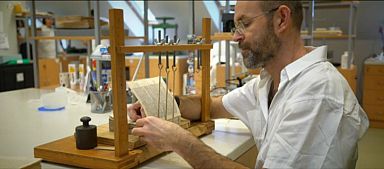Smart Regions meets the experts digitising and preserving millions of books in order to safeguard Slovakia's cultural heritage.
Books are an essential element of any country's culture. To ensure this knowledge is preserved, Slovakia has launched a huge programme to digitise its national literary heritage. Smart Regions met the experts behind the project.
Books are fragile: time, humidity and simple wear and tear all take their toll. At the Slovak National Library located in the town of Martin a mass digitisation project called Dikda is underway to protect books and other documents from such threats.
For the general public it's also a new way of experiencing their national culture.
"The next generation can come here and see how life and our culture were like fifty or hundred years ago," says teacher Marian Baleja.
By the end of 2018, the project had digitised more than 2,800,000 objects at a total cost of some €40.2 million. Around €27.7 of that came from the European Union's Cohesion Policy.
56 million pages digitised
Thanks to the Dikda project more than 56 million pages, from books and other documents, have been preserved on a huge digital database.
"Digitisation made this task of preserving cultural heritage for posterity much easier for us, because the circulation of physical documents among the users is growing less and less, because they can access the digital copies," says Jan Kovachi, the coordinator of the Dikda project at the Slovak National Library.
The process starts by transferring the books to a brand new state-of-the-art conservation centre.
A team of specialists clean, test and restore the books before the digitising procedure begins. A manual or automatic scanner is used, depending on the type and the condition of the book. The entire literary heritage of Slovakia has been copied by these machines.
_"Generally, it's around 3,000 pages per each scanner (per day). We have 20 scanners here, so we can do the math, it's up to 60,000 pages per day," explains Lubos Gloncak, a Digitisation Methodology expert at the Slovak National Library.
_
Testing for bacteria
But saving a book amounts to much more than just making a digital copy of it. Specialists at the library carry out a series of tests to detect and neutralise any bacteria that might develop and damage a book's pages over time.
"I detect all the micro-organisms (on the pages of the books). Then what is important to know is what I am dealing with, so we can decide some strategies to destroy them (the bacteria) and to save the book," says paper conservationist, Nora Rapava.
While the 3-year programme to digitise Slovakia's literary heritage is almost complete, the experts and infrastructure in Martin will remain in place so that thousands of other documents can be safeguarded for the future.












